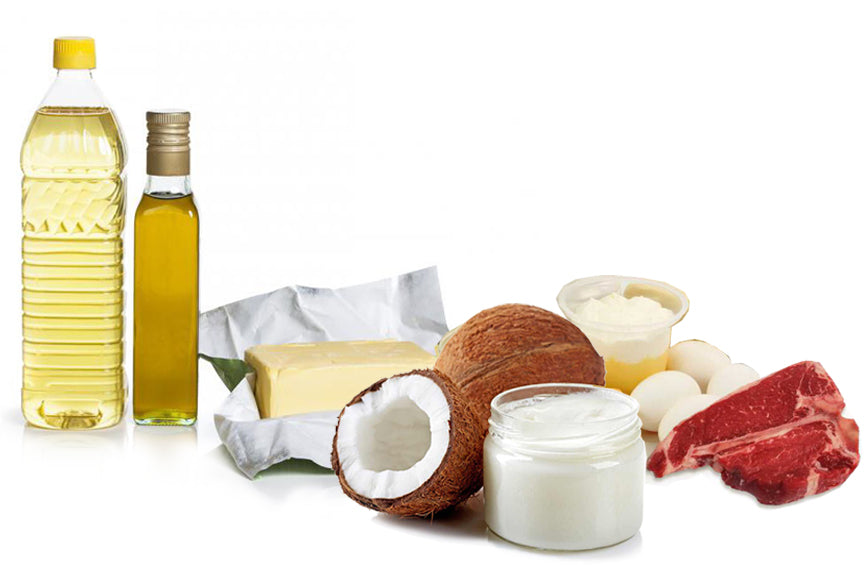In last week's post, we explored whether or not all saturated fats are the same. In today's post, we'll revisit CocoTherapy CEO & co-founder, Charisa Antigua's recent interview with lipids expert, Dr. Bruce Fife, C.N., N.D. This time, we'll take a look at another topic they discussed – the way in which medium-chain fatty acids (MCFAs) are processed by the body.

What Are Medium-Chain Fatty Acids?
Medium-chain triglycerides (MCTs) are a type of fat (lipid). All fats and oils are made of triglycerides, and there are many different types. When consumed, the body breaks down MCTs into medium-chain fatty acids (MCFAs), a special group of fat molecules composed of chains of 6-12 carbon atoms.
Most dietary fats consist of long-chain fatty acids (LCFAs), which have chains of 13-21 carbon atoms. LCFAs are difficult for the body to break down and process. This means that they can put a lot of strain on the digestive system and internal organs such as the liver and pancreas. LCFAs are also commonly stored as fat, increasing the risk of conditions such as obesity and cardiovascular disease. In the next section of the post, we'll take a look at how MCFAs are metabolized by the body.
How Are Medium-Chain Fatty Acids Metabolized?
Before we dive into the role of MCFAs, let's take a closer look at how LCFAs are processed by the body. When LCFAs are consumed, they are broken down by a special enzyme called pancreatic lipase. They are then converted into small packets or globules of fats called chylomicrons. These chylomicrons are absorbed through the small intestines and travel through the lymphatic system and bloodstream.
In animals, the absorption of chylomicrons increases serum triglycerides for 3-10 hours immediately after a meal. Once in the liver, the fats are further broken down by bile acids. They then either undergo beta oxidation, biosynthesis to cholesterol, or are repackaged as triglycerides. The triglycerides and cholesterol are then released back into the bloodstream and transported to various other organs in the body.
As we mentioned earlier, the way in which LCFAs are processed can put a lot of strain on the body. In addition, the resulting increase in blood lipid levels can contribute to atherogenesis, a process in which fatty deposits form in the arteries, gradually constricting them.
MCFAs are processed by the body in a completely different way. First, they are absorbed through the small intestine without needing pancreatic lipase for digestion. MCFAs then travel through the portal vein directly to the liver, instead of through the blood or lymphatic system. This means that they do not get stored in fatty adipose tissues. The liver then metabolizes the MCFAs without the need for bile acids, and releases them as energy.
Thanks to the way in which MCFAs are metabolized, they do not increase blood lipid levels or contribute to atherogenesis. In fact, MCFAs are responsible for a wide range of health benefits (more on this in a moment).
Medium-Chain Fatty Acids in Coconut Oil
Virgin coconut oil is the richest source of MCTs found in nature. It is broken down by the body into different types of beneficial MCFAs. Coconut oil contains 64% MCFAs. Therapeutic-grade oil such as CocoTherapy coconut oil contains high levels of lauric acid (at least 53% compared to 40% or less in grocery store brands). It also contains capric acid and caprylic acid, which are responsible for a number of health benefits.
Lauric acid is often considered the most beneficial of the MCFAs. It is antibacterial, antimicrobial, and antiviral. It also gives coconut oil its immune-supporting properties and promotes overall health. Capric and caprylic acid are known to have powerful antifungal properties and support a range of healthy bodily functions.
The following quote from Dr. Bruce Fife, C.N., N.D.'s book, Coconut Therapy for Pets, explains more about the benefits of MCFAs in coconut oil:
"What are some of the health benefits of MCFAs? For one, they possess potent antimicrobial properties capable of fighting off disease-causing bacteria, viruses, fungi, yeast, and parasites, without causing any harm to infants or to us. They can help moderate sugar release and help balance blood sugar levels, which can ease symptoms associated with diabetes. They possess anti-cancer properties. They provide a quick and easy source of energy which can boost metabolism and aid in weight management. They have antioxidant effects, are anti-inflammatory, and boost immune function. They can improve overall health and wellbeing. And contrary to popular misconceptions about saturated fat, coconut oil causes no harm to the heart or arteries, but acts as a heart tonic and improves heart function."
Supplementing your pet's diet with coconut oil is a fantastic way to support their overall health and protect them from illness throughout their lifetime. Just be sure to choose a high-quality oil such as CocoTherapy Virgin Coconut Oil. Our oil contains high levels of MCFAs that are responsible for the health benefits we've outlined in this post. It's a natural, healthy product that's backed by science and has been successfully used to improve human and animal health for centuries.
Have you heard about our latest product, CocoTherapy TriPlex™ MCT-3 Oil? Check out our recent post to discover the unique health benefits it offers.



